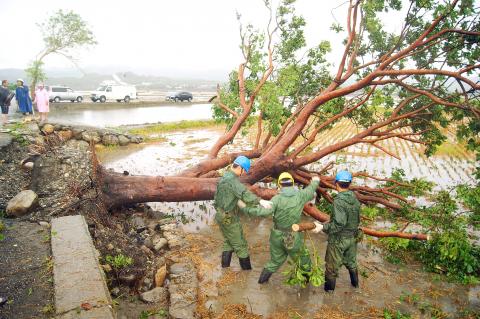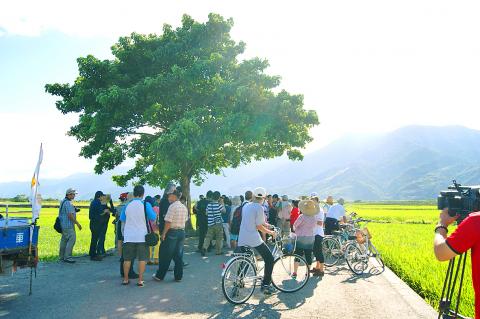What is arguably the most famous tree at Taiwan’s east coast region was uprooted during Typhoon Matmo’s onslaught on Tuesday evening, leaving the local government and residents at odds over its fate.
Standing alone next to a road between rice paddies and farmlands against a backdrop of green mountains in Taitung County’s Chihshang Township (池上), the red cedar has become a popular tourist attraction after being featured in EVA Air’s “I See You” international advertising campaign since last year.
The television ad shows Taiwanese-Japanese actor Takeshi Kaneshiro (Jin Cheng-wu, 金城武) riding a bicycle along the rural road and stopping in the shade of the tree to drink a cup of tea.

Photo: Wang Hsiu-ting, Taipei Times
The advertisement resulted in visitors flocking to the site’s postcard-perfect surroundings to take photographs with the tree, which has become known as the “Takeshi Kaneshiro tree.”
Yesterday morning, after Typhoon Matmo pummeled the east coast, a local resident found the tree uprooted and lying in a rice paddy.
Some local residents said they are saddened by the tree’s demise, with the Chihshang Township Council and the Taitung County Government vowing to save the tree by replanting it in its original position.

Photo: Wang Hsiu-ting, Taipei Times
However, another group of local residents has voiced their objections, saying that the “Takeshi Kaneshiro tree” should not be saved, because it had caused them many headaches and problems.
The objecting group said that the large daily influx of tourists who visit the site to take photographs with the tree has been detrimental to their small village because it creates traffic congestion, air and noise pollution, and trash that has to be cleaned up, all of which create a financial burden.
“I don’t want to see that tree replanted. Us farmers around here do not want all these tourists bringing all sorts of problems with them,” a local farmer said.
He added that only the government and some businesses reaped the benefits of increased tourism, while the farmers suffered most from having to deal with the crowds of tourists and received no benefits at all.
A Taiwan Tree Protection Alliance (台灣護樹團體聯盟) spokesperson, identified only as “Angela,” said the typhoon was the final straw in the demise of the tree, as the alliance had last year already warned that the “Takeshi Kaneshiro tree” was being abused and maltreated.
“[The base of] this famous tree was surrounded and covered by asphalt, which gets very hot in the sun, and its roots were in bad condition due to the asphalt preventing the circulation of air and water. Many cars and tourists [visiting the site] also played a role in destroying the tree’s surrounding habitat,” Angela said yesterday.
Government officials insisted that they plan to replant the tree, but with local residents and environmental groups opposing such a move, a battle between tourism and economic development versus farmers and the need to protect nature is sure to follow.

Taiwanese can file complaints with the Tourism Administration to report travel agencies if their activities caused termination of a person’s citizenship, Mainland Affairs Council Minister Chiu Chui-cheng (邱垂正) said yesterday, after a podcaster highlighted a case in which a person’s citizenship was canceled for receiving a single-use Chinese passport to enter Russia. The council is aware of incidents in which people who signed up through Chinese travel agencies for tours of Russia were told they could obtain Russian visas and fast-track border clearance, Chiu told reporters on the sidelines of an event in Taipei. However, the travel agencies actually applied

Japanese footwear brand Onitsuka Tiger today issued a public apology and said it has suspended an employee amid allegations that the staff member discriminated against a Vietnamese customer at its Taipei 101 store. Posting on the social media platform Threads yesterday, a user said that an employee at the store said that “those shoes are very expensive” when her friend, who is a migrant worker from Vietnam, asked for assistance. The employee then ignored her until she asked again, to which she replied: "We don't have a size 37." The post had amassed nearly 26,000 likes and 916 comments as of this

New measures aimed at making Taiwan more attractive to foreign professionals came into effect this month, the National Development Council said yesterday. Among the changes, international students at Taiwanese universities would be able to work in Taiwan without a work permit in the two years after they graduate, explainer materials provided by the council said. In addition, foreign nationals who graduated from one of the world’s top 200 universities within the past five years can also apply for a two-year open work permit. Previously, those graduates would have needed to apply for a work permit using point-based criteria or have a Taiwanese company

The Shilin District Prosecutors’ Office yesterday indicted two Taiwanese and issued a wanted notice for Pete Liu (劉作虎), founder of Shenzhen-based smartphone manufacturer OnePlus Technology Co (萬普拉斯科技), for allegedly contravening the Act Governing Relations Between the People of the Taiwan Area and the Mainland Area (臺灣地區與大陸地區人民關係條例) by poaching 70 engineers in Taiwan. Liu allegedly traveled to Taiwan at the end of 2014 and met with a Taiwanese man surnamed Lin (林) to discuss establishing a mobile software research and development (R&D) team in Taiwan, prosecutors said. Without approval from the government, Lin, following Liu’s instructions, recruited more than 70 software